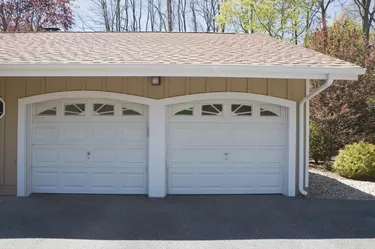
Building a garage is a common home improvement project. Homeowners can decide to build a garage as an addition to a house, build a separate garage with its own rooms, or construct a simple garage structure for a much lower cost. In most cases, the project will fundamentally change the nature of the property and home. These changes will in turn affect property value. Depending on how and why the garage is built, several tax advantages may be possible for homeowners looking to save money in the future.
Home Office
Video of the Day
One tax write-off to be aware of is available for home offices. If homeowners are willing to spend the extra money to include a home office in the garage, they should be able to write off the expenses associated with that section, including utilities. Homeowners may be able to build an office section onto the garage to qualify or include space in the garage for a workroom for a business that involves more hands-on projects.
Video of the Day
Tax Basis Additions
When you build a garage, it counts as a sizable home improvement project. While actual tax deductions for this project are low in the beginning, if you ever sell the house, they will be realized through an increased tax basis. Because the value of the property is permanently shifted up, the tax basis will be raised and you will be taxed on a lower amount of gains than without the addition, leading indirectly to tax savings.
Loans for the Garage
Many homeowners need to take out some kind of loan for their garage projects, such as a refinance or home improvement mortgage. In most cases, these loans have interest payments that are deductible. For a refinance, interest points purchased at closing can be deducted through the life on the loan. Monthly interest payments on home improvement loans are also often tax deductible during the year in which they are paid.
Variance in Tax Credits
Both the federal government and state governments offer a variety of tax credits to encourage certain types of businesses or practices. For example, in 2010 there were tax credits available for including energy saving materials in a home improvement project. These credits shift and change with time, running out and being replaced or extended. Homeowners should check with current federal and state tax laws to see if there are any applicable tax credits currently available.